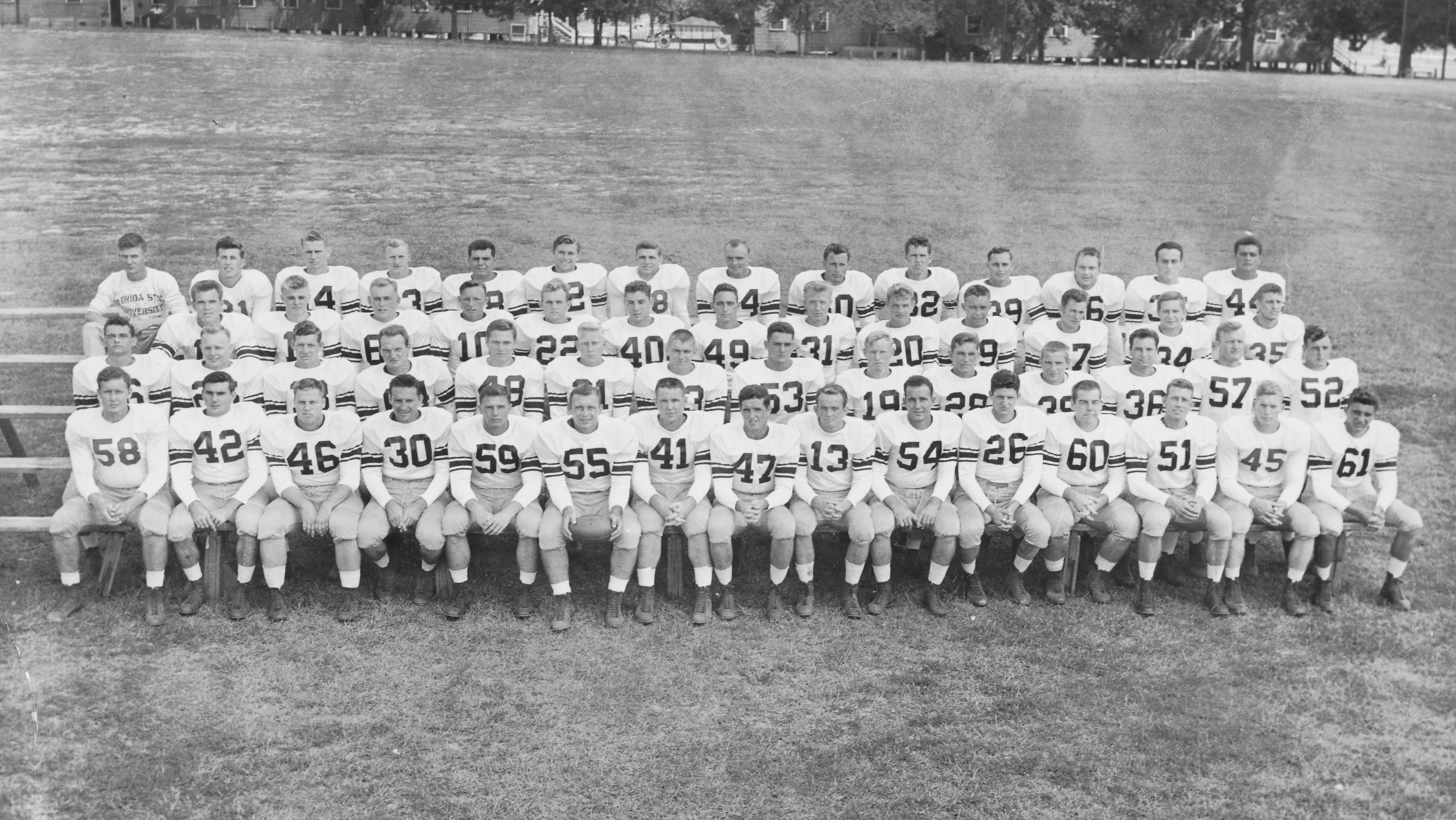
1950 FSU Football Team
Sixty Years Ago: 1950 - A new stadium and an undefeated team
By Jim Joanos
The year 1950 was a very important one for Florida State University football. That was the year that FSU moved into Doak Campbell Stadium and had its first ever undefeated season. It was also the same year that a number of other interesting things happened.
 |
1950 FSU Football Team |
It was only the fourth year of the modern era of playing intercollegiate football. The team was a member of the small school, low key, Dixie conference which did not allow members to provide athletic scholarships. But fans had already begun dreaming of the day when the Seminoles might develop its program into one of big time stature.
The season began with a lot of positive enthusiasm and high hopes. Head coach Don Veller had come on board in 1948 and in his first two seasons the team had registered records of 7 wins and 1 loss, and 9 wins and 1 loss. The 1949 season had been closed out with an amazing 19-6 victory over previously unbeaten and small college powerhouse Wofford in Tampa's Cigar Bowl. In addition, thanks to some strong home town support, FSU's "new" Doak Campbell Stadium was being built and the team would be moving in soon.
The team began the 1950 season with a resounding victory on the road over Troy State, 26-7. Among the highlights were two blocked punts by FSU 150-pound end Jim Arnold from Bainbridge, Georgia, one of which he took in for a touchdown, and the overall play of newly acquired back Tommy Brown of Tallahassee who had played for Army in 1949.
In the second game of the season, FSU scored six touchdowns in racking up a 40-7 win over Randolph Macon College. It was the first game ever played by FSU at Campbell Stadium. Turning out for the event were 9,676 fans, a new attendance record for FSU games.
Two weeks later, at Campbell Stadium, FSU earned a hard fought 20-6 victory over Howard College (now known as Samford University, the same school that FSU will open the 2010 season with) and that team's star quarterback, Bobby Bowden (the same man that later became FSU's legendary head coach). Bowden made some good plays but also had one costly interception.
 |
Nelson Italiano |
On the road, FSU in its fourth game of the season, shut out Newberry College, 24-0. In the fray, FSU's tailback Nelson Italiano, was involved in three of the four touchdowns scored. He threw for two (an 80-yard pass play to Eddie Gray and a 20 yard one to Clint "Pudge" Thomas) and ran in from 33 yards out for the other.
The fifth game of the season against the University of the South ("Sewanee") served as the Homecoming game and Doak Campbell Stadium Dedication Day. The festivities were presided over by University President Campbell (for whom the stadium was named), National FSU Alumni President Alma Warren (the sister of the then Governor of the State of Florida, Fuller Warren) and the Student Government President, "Rube" Askew (an Army veteran who would later become Governor of Florida and a national leader of prominence). FSU fans were not only treated to a 14-8 victory but enjoyed a couple of additional major happenings by the FSU marching band. It was announced that from that point forward, the band would bear the name of "Marching Chiefs" and for the first time ever at a football game the band introduced FSU's new "Fight Song". The music had been written by music professor Tommie Wright and the lyrics by a student, Doug Alley.
FSU next went on the road and defeated Stetson, 27-7. In the contest, Italiano completed two more touchdown passes. FSU's seventh game of the season was won at home on a cold night, 33-0, over Mississippi College. Italiano again threw two touchdown passes.
The eighth and last game of that 1950 season was especially memorable. It was sixteen degrees and the wind was blowing. There were long icicles hanging from the water tower in view from Campbell Stadium. At halftime, Veller took the team into the team bus which was parked at the stadium and turned on the bus's heater, because the team room in the new stadium was not warm enough. In any event, FSU beat Tampa on 35-19 to complete a perfect season. Another special thing happened during that game. FSU's Tommy Brown had an 84-yard punt. The ball went over the defensive back's head and just kept bouncing and rolling, rolling on the frozen ground.
The 1950 team turned down an invitation to play again in the Cigar Bowl. The year before, the team had expected to receive commemorative watches for playing in the bowl. Instead, they got miniature rubber toy footballs. It had left a bad taste in their mouths. In addition, since they had no scholarships to play football, many of the players had Christmas jobs that allowed them to make some much needed money for school. They voted against the return trip to Tampa.
Thus concluded one of FSU football's most interesting seasons.